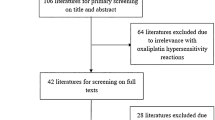Abstract
Background
Oxaliplatin is a platinum compound that is clinically effective for colorectal cancer (CRC), in combination with 5-fluorouracil (5-FU) and leucovorin (LV), and it is widely used for metastatic disease and for the adjuvant treatment of stage III CRC. With the increasing use of oxaliplatin in Japan, serious adverse events have been experienced other than hematologic and neurologic toxicities.
Methods
In order to clarify the clinical features of allergic reactions to oxaliplatin, we retrospectively investigated CRC patients who had received oxaliplatin-based chemotherapies.
Results
One hundred and twenty-five CRC patients who had been treated with FOLFOX regimens (containing oxaliplatin, 5-FU, and LV) were examined, and 21 patients (17%) were found to have developed allergic reactions. Sixteen patients (13%) had grade 1/2 adverse events, classified according to the common terminology criteria for adverse events (CTC-AE) version 3.0 and 5 (4%) had grade 3/4 adverse events. The allergic reaction appeared after a median number of nine cycles (range, 2–15 cycles). Previous chemotherapy included 5-FU/LV, CPT-11, and S-1. All of the patients with allergic reactions recovered completely when treated with antiallergy drugs. Oxaliplatin was reintroduced in 11 patients, with the use of prophylactic agents; allergic reaction to the reintroduction was not observed in 8 patients and grade 1/2 allergic reactions developed in 3 patients. No correlation was identified between allergic reaction and patients’ background characteristics such as sex, history of allergy, and profile of other adverse events.
Conclusion
Allergic reactions to oxaliplatin remain an important issue for patients being able to safely continue effective chemotherapies; further analysis will be needed to establish methods for the prediction and prophylaxis of such reactions.
Similar content being viewed by others
References
De Gramont A, Figer A, Seynour M, et al. (2000) Leucovorin and fluorouracil with or without oxaliplatin as first line treatment in advanced colorectal cancer. J Clin Oncol 18:2938–2947
Goldberg RM, Sargent D, Morton RF, et al. (2004) N9741: FOLFOX (oxaliplatin (Oxal)/5-FU/leukovorin (LV)) or reduced dose R-Ifl(CPT-11 + 5-FU/LV) in advanced colorectal cancer (CRC): final efficacy data from an Intergroup Study. J Clin Oncol 23:275 (Suppl; abstract 3621)
Tvagi P, Grothey A (2006) Commentary on a phase III trial of bevacizumab plus XELOX or FOLFOX4 for first-line treatment of metastatic colorectal cancer: the NO16966 trial. Clin Colorectal Cancer 6:261–264
Andre T, Boni C, Mounedji-Boudiaf L, et al. (2004) Multicenter international study of oxaliplatin/5-fluorouracil/leukovorin in the adjuvant treatment of colon cancer (MOSAIC) investigators: oxaliplatin, fluorouracil and leukovorin as adjuvant treatment for colon cancer. N Engl J Med 50:2243–2251
Thomas RR, Quinn MG, Schuler B, et al. (2003) Hypersensitivity and idiosyncratic reactions to oxaliplatin. Cancer 97:2301–2307
Siu SW, Chan RT, Au GK (2006) Hypersensitivity reactions to oxaliplatin:experience in a single institute. Ann Oncol 17:2590–2261
Maindrault-Goebel F, Andre T, Tournigand C, et al. (2005) Allergic-type reactions to oxaliplatin: retrospective analysis of 42 patients. Eur J Cancer 41:2262–2267
Gowda A, Goel R, Berdzik J, et al. (2004) Hypersensitivity reactions to oxaliplatin: incidence and management. Oncology 18: 1671–1675
Brandi G, Pantaleo MA, Galli C, et al. (2003) Hypersensitivity reactions related to oxaliplatin (OHP). Br J Cancer 89:477–481
Shleback AA, Clark PI, Green JA, et al. (1995) Hypersensitivity and cross-reactivity to cisplatin and analogues. Cancer Chemother Pharmacol 35:349–351
Koren C, Yerushalmi R, Katz A, et al. (2002) Hypersensitivity reaction to cisplatin during chemoradiation therapy for gynecologic malignancy. Am J Clin Oncol 25:625–626
Basu R, Rajkumar A, Datta NR (2002) Anaphylaxis to cisplatin following nine previous uncomplicated cycles. Int J Clin Oncol 7:365–367
Polyzos A, Tsavaris N, Kosmas C, et al. (2001) Hypersensitivity reactions to carboplatin administration are common but not always severe: a 10-year experience. Oncology 61:129–133
Zanotti KM, Rybicki LA, Kennedy AW, et al. (2001) Carboplatin skin testing: a skin-testing protocol for predicting hypersensitivity to carboplatin chemotherapy. J Clin Oncol 19:3126–3129
Stahl M, Koster W, Wikle H (2001) Reaction after oxaliplatin — prevention with corticosteroids? Ann Oncol 12:874
Morgan JS, Adams M, Mason MD (1994) Hypersensitivity reactions to carboplatin given to patients with relapsed ovarian carcinoma. Eur J Cancer 30:1205–1206
Santini D, Tonini G, Salerno A, et al. (2001) Idiosyncratic reaction after oxaliplatin infusion. Ann Oncol 12:132–133
Newman Taylor AJ, Cullinan P, Lympany PA, et al. (1999) Interaction of HLA phenotype and exposure intensity in sensitization to complex platinum salts. Am J Respir Crit Care Med 160: 435–438
Markmen M, Kennedy A, Webster K, et al. (1999) Clinical features of hypersensitivity reactions to carboplatin. J Clin Oncol 17: 1141–1145
Sliesoraitis S, Chikhale PJ (2005) Carboplatin hypersensitivity. Int J Gynecol Cancer 15:13–18
Lee MY, Yang MH, Liu JH (2007) Severe anaphylactic reactions in patients receiving oxaliplatin therapy: a rare but potentially fatal complication. Support Care Cancer 15:89–93
Mis L, Fernando NH, Hurwitz HI, et al. (2005) Successful desensitization to oxaliplatin. Ann Pharmacother 39:966–969
Tournigand C, Cervantes A, Figer A, et al. (2006) OPTIMOX1: a randomized study of FOLFOX4 or FOLFOX7 with oxaliplatin in a stop-and-go fashion in advanced colorectal cancer — a GERCOR study. J Clin Oncol 24:394–400
Author information
Authors and Affiliations
Corresponding author
About this article
Cite this article
Shibata, Y., Ariyama, H., Baba, E. et al. Oxaliplatin-induced allergic reaction in patients with colorectal cancer in Japan. Int J Clin Oncol 14, 397–401 (2009). https://doi.org/10.1007/s10147-009-0883-6
Received:
Accepted:
Published:
Issue Date:
DOI: https://doi.org/10.1007/s10147-009-0883-6




